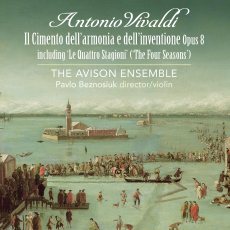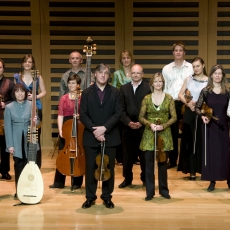The Avison Ensemble - Vivaldi: Concerti Opus 8 - Classical Source
It is incredible, although immensely popular in his own lifetime, that the name of Antonio Vivaldi all-but faded into obscurity after his death in 1741. Doubly incredible because, following the rediscovery of his music in the 1950s, Vivaldi is now among the most well-known of all composers. He owes his universal fame to one work in particular - or rather, four works: a collection of violin concertos that depict, in vivid musical language, each of the seasons. The Four Seasons is one of the most recorded works ever - with versions in all manner of styles to suit every possible taste. Yet this doesn't dampen record companies' enthusiasm for churning out new recordings - but do we need them?
It is only possible to answer that in each instance. In the case of The Avison Ensemble, it is an emphatic 'yes' - especially as we are offered all twelve concertos which make up Vivaldi's magnificent Opus 8, grandly, if somewhat enigmatically, entitled "The Trial between Harmony and Invention". Under the direction of Pavlo Beznosuik - who also takes the solo violin lines - these ingratiating performances are full of thoughtful and thought-provoking insight.
The North of England-based Avison Ensemble plays on period instruments, but those who are used to the pungent, even aggressive, cut-and-thrust of groups such as Fabio Biondi's Europa Galante may be surprised by this more refined sound. Beznosiuk's approach is instantly apparent in the first movements of ‘Spring' and ‘Autumn', with their relatively long note-values and smoother articulation than most historically-informed bands. Much of the playing is enchantingly beautiful, but also persuasively apt - subtle solo ornamentation in the second movement of ‘Spring'; the marvellously pulsing orchestral build-up at the start of ‘Winter'; and the sweetly lyrical solo in its second movement, effectively contrasted with the unusually energetic cello line and delicate pizzicato violins.
Beznosuik is a sensitive soloist, not shy to take the limelight, but never one to hog it. And it soon becomes apparent that he and the Ensemble are also capable of the rawness and bite of other groups - but the musicians employ them more sparingly and, arguably, with stronger impact. You will be disappointed if you want the barking dog in ‘Spring' to leap uncouthly from the texture; but the final movement of ‘Winter' is ear-pinning in its intensity, and the conclusion of ‘Autumn' has a visceral incisively-edged attack, infused with the pungent earthiness of percussively strumming lute.
The remaining eight concertos display the same characteristics. Highlights include Beznosiuk's extraordinary virtuosic displays over sustained pedal notes in the finale of No.8; the almost Bach-like sophistication of No.11 - the most substantial concerto in the set and Beznosiuk's favourite; and the unrestrained rustic joy of No.12. Occasionally a touch more flamboyance would be welcome, such as in the ebullient first movement of No.5, ‘The Storm at Sea', which sounds more like a minor squall, but in general these are well-nuanced performances that will amply reward repeated listens.
We tend to take The Four Seasons for granted - music that is always around us - but if you haven't made the time to fully engage with its justly celebrated charms and startling originality recently, there is no better way to do so than with this delightful set. The SACD sound is admirably well-balanced, clear and immediate.

